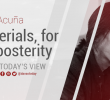God shall be thanked for Philippine Abaca, according to Philippine Fiber Industry Development Authority (PhilFIDA), because our country “controls 87% of the world’s production of abaca”—harvested for its fiber—an essential material to make a surgical mask—a socially accepted mode of defense against novel coronavirus—the epidemic that emphasizes vulgar symptoms of our moribund public healthcare system in particular and the crises of the neoliberal “order” in general. The preceding kilometric sentence is a sort of extended retelling of PhilFIDA’s Facebook post, albeit loaded with critical implications and scare quotes: one a direct citation from the organization’s page for the purposes of discussion later, the other of inversion.
Like most raw materials, we export abaca, which does not necessarily mean we “control” its production, as if we call the shots in the process of trade and exchange; exporting overseas workers as human resources does not translate to “control” of the world’s labor. Worse, “we” do not really export raw materials: feudal lords who own the land, compradors who control foreign economic (and in effect cultural) relations, and bureaucrat capitalists who polish the necessary legalese do—all in the service of imperialism. Systematically, these agents of reaction on one side of class war keep the neo-colonial and semi-feudal “order” by employing repressive and ideological means. Hence, it is more precise to state that the ruling classes of our country export raw materials such as abaca and import products such as surgical masks, which they unabashedly export to people in need, amid volcanic eruptions and virus outbreaks in our country that escalate the demand for protective gear. That’s world-class Filipino hospitality: other countries above self.
Repression and ideology facilitate our default identification with the ruling class worldview via moderation of coercion and consent. In activist parlance, “ideo” is oftentimes short for ideology. For this essay, it is the abbreviation for “import-dependent, export-oriented,” and instead of confronting issues related to corona, we deal with The Kingmaker (2019) by Lauren Greenfield. Despite showing similar fascist tendencies (cf Estrada 2020) of and parasitic relationships between Ferdinand Marcos and Rodrigo Duterte, the documentary obscures the ongoing class war (Ibong Adorno 2020) by juxtaposing Aquinos and allies against Marcos and cronies. The option of “opposition” respondents from Aquino-led Liberal Party, notwithstanding their articulations of People Power as a national phenomenon rather than a family affair or personal feud, reproduces the false dichotomies of Dilawan/DDS, Cory/Marcos, Noynoy/Bongbong, Leni/Duterte.
An act of “recolonizing,” The Kingmaker is a repetition of Ramona Diaz’s film Imelda (2004) (Shimizu 2019), if not a retelling. Retold stories are not just repetitions. Iterations of the folktale of “Maria Makiling” serve different purposes in prose of Pepe (Jose Rizal) and the poem of Pete (Jose F. Lacaba), the former a capiz window to Spanish colonial period, the latter a snapshot of excesses of the Martial Law (ML) regime. Versions of “Pagong at Matsing” somewhat document values of respective ethnolinguistic groups upon rendering oral narratives into transcriptions circulated among enthusiasts; while its contemporary rendition, “Giyera ng Dalawang Kwento” in Banal na Aklat ng mga Kumag (Allan Derain 2013), problematizes issues of retelling itself. As if substituting a proper noun (Imelda) with a common compound noun makes something new, encompassing, timeless and universal, The Kingmaker exemplifies ideo production: a despotic portrait exported and initially exhibited to an international audience—only to be imported back to the Philippines.
Hundreds of hours of footages are the abaca, the film the surgical mask; but is it meant to help prevent the return to power of the Marcoses? Imelda’s clownery caught on film may reinforce charms of “the true, the good, the beautiful,” as humor can trigger laughter that may be reactionary or conservative, instead of critical and subversive (Critchley 2002; McGowan 2014). Intentional or otherwise, choosing to include in the documentary Noynoy Aquino saying “those who cannot learn from history are doomed to repeat it” yellow-washes the fact that two Aquino regimes failed to dismantle ML structures of oppression. From maharlika nobilities, Marcoses (and by association, Dutertes) were cast as pathetic jesters, while Aquinos reclaim decency, as benevolent “democratic” landlords. For both clans and others within their social class, business as usual is ideo; it’s just a matter of which cult personality takes the helm.
The unfunny joke amid all of these? While Imelda was uploaded somewhere online available for free streaming, exclusive screenings of The Kingmaker prompted some of its patrons to advocate for more commercial screenings. Taking materials from other sectors, rebranding or repackaging stories, and different means of appropriation remain controversial ethical dilemmas—brought about by exported raw materials, imported products, objectified narratives, and foreign productions. Issues about the Oscars sweep of Parasite (2019) might likewise be raised (cf Strike II in Cruz 2020): Are garnered awards an indictment of the filthy rich, or merely a celebration of brilliance and novelty of the cultural product?
Hopefully, concluding this way would not strike one as a simplistic yet elaborate reframing of foreign Cadbury versus Filipino Chocnut discourse but a means to think and to act about and against ideo narratives and productions. Is the film a commodity or propaganda? Is the mask a safety measure or a business opportunity? Whose interests does the producer (of films and masks and other products) serve? Hence, the timeless question: for whom, against whom? Does cinema condemn imperialist alchemists and their fascist chimeras, or are we condemned to watch the cinema of the ruling class that grants emancipatory dreams by containing them within the screen? (davaotoday.com)






